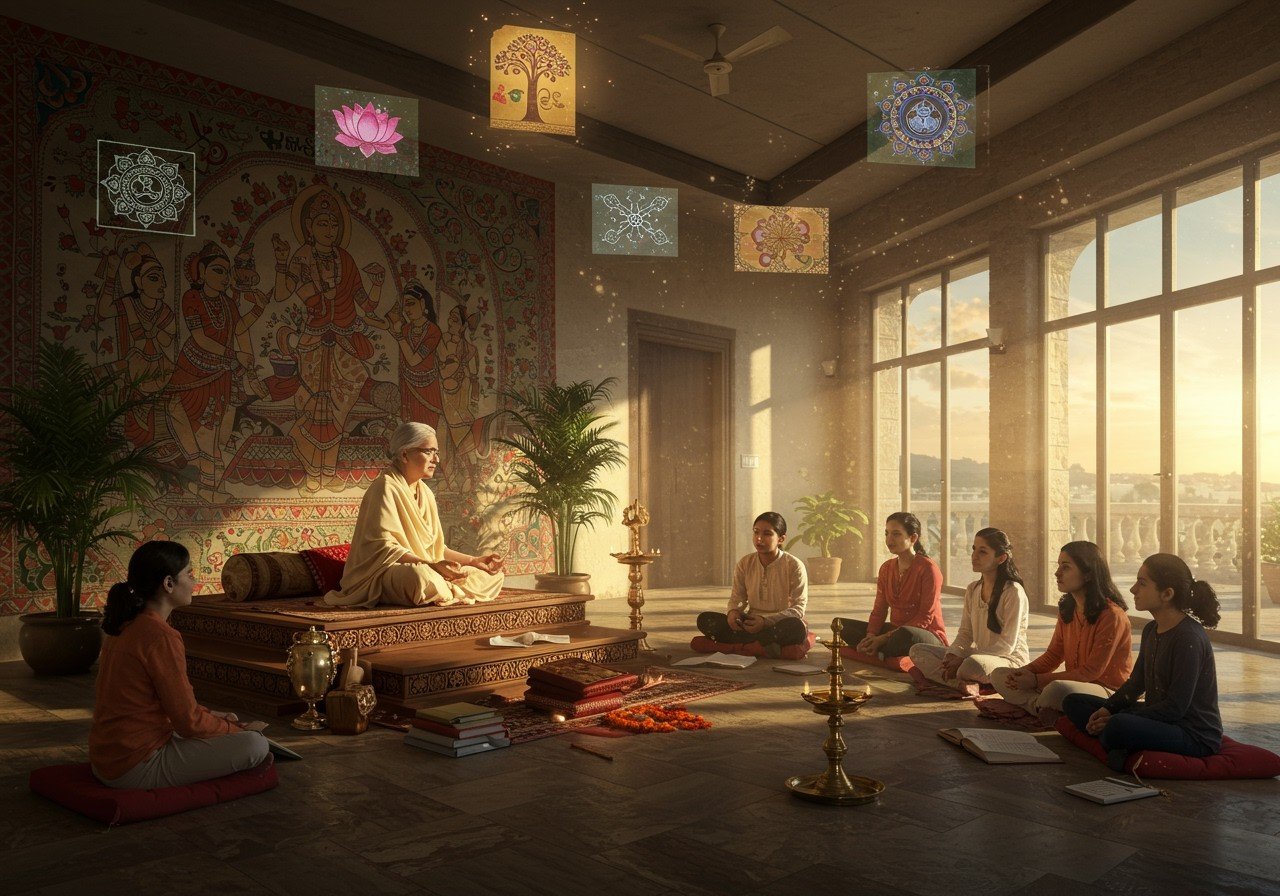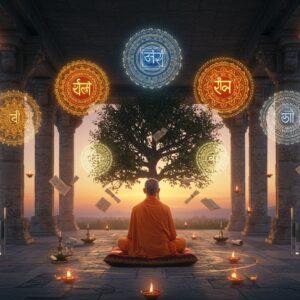
Indian philosophy has profoundly shaped educational values and learning approaches. Rooted in ancient scriptures and traditions, it continues to guide modern educational practices. By understanding its historical context and core principles, we can appreciate its enduring relevance in today’s world. For those seeking to deepen their understanding and practice, Poojn.in offers a wide selection of spiritual and educational resources, including sacred texts, puja items, and more. Explore our collection at www.poojn.in.
Historical Context of Indian Philosophy
Indian philosophy’s origins trace back to ancient texts like the Vedas (c. 1500-500 BCE) and Upanishads (c. 800-500 BCE). Influential figures like Adi Shankaracharya (788-820 CE), Gautama Buddha (c. 563-483 BCE), and Mahatma Gandhi (1869-1948) contributed significantly to its development. Diverse schools of thought, including Vedanta, Buddhism, Jainism, and Yoga, have collectively shaped educational ideologies.
- Vedas and Upanishads: These ancient scriptures form the bedrock of Indian philosophical thought, exploring profound questions about existence, knowledge, and the nature of reality. They continue to be studied and revered for their wisdom and insights.
- Key Philosophers: Adi Shankaracharya, a proponent of Advaita Vedanta, systematized the non-dualistic interpretation of the Upanishads. Gautama Buddha, the founder of Buddhism, emphasized the path to enlightenment through self-discovery and mindful living. Mahatma Gandhi, inspired by ancient Indian ideals, advocated for non-violence and social justice.
- Schools of Thought: Vedanta focuses on the attainment of ultimate knowledge and liberation. Buddhism emphasizes the cessation of suffering and the path to enlightenment. Jainism prioritizes non-violence and the pursuit of spiritual purity. Yoga emphasizes physical and mental disciplines for self-realization.
Core Values in Indian Philosophy and Education
Indian philosophy emphasizes values like Dharma (duty/righteousness), Karma (action/consequence), and Moksha (liberation). These values encourage holistic development, moral integrity, and a commitment to lifelong learning. Poojn.in offers a curated selection of products designed to support your spiritual journey and cultivate these values, from incense for mindful practice to sacred texts for deeper study. Visit www.poojn.in to discover more.
- Dharma: Dharma emphasizes ethical conduct, fulfilling one’s responsibilities, and living in accordance with cosmic order. It guides individuals towards righteous action and societal harmony.
- Karma: The principle of Karma highlights the interconnectedness of actions and their consequences, shaping one’s present and future experiences. It underscores the importance of mindful choices and ethical behavior.
- Moksha: Moksha represents the ultimate goal of spiritual liberation, freedom from the cycle of birth and death, and the realization of one’s true nature. It inspires individuals to seek self-knowledge and transcend limitations.
These principles cultivate self-awareness, discipline, and reverence for teachers and elders.
Indian Philosophy’s Influence on Learning Methodologies
Traditional Indian education employed the Gurukul system, where students resided with their Guru (teacher). This immersive approach emphasized experiential learning, meditation, and introspection. Modern adaptations incorporate mindfulness practices and value-based education. You can find resources to support these practices at www.poojn.in, including meditation supplies and traditional educational materials.
- Gurukul System: In the Gurukul system, students lived with their teacher, fostering a close relationship and facilitating the transmission of knowledge, values, and practical skills. This holistic approach integrated learning with daily life.
- Experiential Learning: This method emphasized learning through direct experience, observation, and participation, encouraging a deeper understanding and application of knowledge.
- Modern Adaptations: Modern education incorporates elements of Indian philosophy through mindfulness exercises, promoting emotional regulation and focused attention, and value-based education, emphasizing ethical development and character building.
Contemporary Relevance and Application
Indian philosophy offers valuable insights for navigating modern challenges such as stress management and ethical dilemmas. Schools are increasingly integrating these principles into their curricula to foster holistic student development. Technology plays a key role in making this traditional wisdom accessible to a wider audience. Enhance your learning environment with authentic puja items, sacred texts, and more from www.poojn.in.
- Modern Challenges: Indian philosophy provides frameworks for addressing contemporary issues like stress, anxiety, and ethical decision-making, offering practical tools for navigating complex situations.
- Holistic Development: Educational institutions are integrating principles of Indian philosophy to promote holistic development, encompassing intellectual, emotional, moral, and spiritual growth. This approach nurtures well-rounded individuals equipped to contribute meaningfully to society.
Conclusion
Indian philosophy has profoundly impacted education by embedding values like Dharma, Karma, and Moksha into learning methodologies. Its historical roots and diverse schools of thought offer a rich foundation for holistic development. The Gurukul system’s emphasis on experiential learning and modern adaptations like mindfulness practices continue to influence contemporary education. As we integrate these timeless principles into our educational systems, we not only honor our heritage but also equip future generations with the wisdom to lead meaningful lives. Explore Poojn.in’s collection of Bel malas, Tulsi malas, and other spiritual items to support your educational journey.


